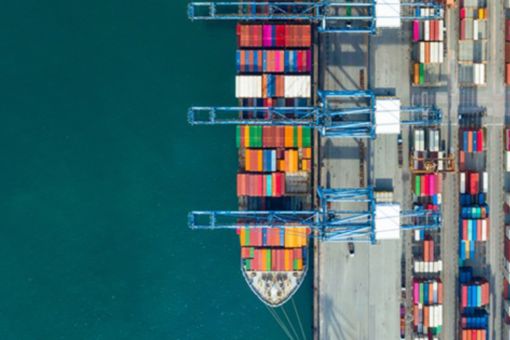KPMG is ready for the new Shipping Industry era
Interview in NAFS.gr: By Ioannis Bravos, Partner, Head of Shipping, KPMG in Greece
Interview in NAFS.gr: By Ioannis Bravos, Partner, Head of Shipping, KPMG in Greece
COP26. What does really mean for the maritime industry?
Shipping was high on the agenda at COP26. In the wake of the conference, the Marine Environment Protection Committee of IMO (MEPC) at its 77th meeting on November had agreed to initiate the revision of the Initial IMO Strategy on Reduction of GHG emissions from ships, recognizing the need to strengthen the ambition during the revision process. In this respect, we expect to see even more ambitious and challenging targets, after 2023, when the revised strategy is expected to be adopted, as there are voices, even within the industry, that call for the IMO to set a target for zero emission shipping by 2050.
Of significant importance I believe is the coal phase-out commitment that has been made by 23 countries, including five of the world’s top 20 coal power generating countries. In case it will materialize, it is expected to significantly affect the players at the respective shipping trade.
The Clydebank Declaration for green shipping corridors that has been signed by 14 countries and the Dhaka-Glasgow Declaration that has been signed by 50 countries during the conference are also expected to deliver impact to the industry.
What are the challenges the sector has to face in order to comply with the new environmental standards?
The targets set by the IMO are ambitious and are expected to become even more ambitious. To move to a “cleaner” shipping, we not only need new “clean” maritime fuels and new technologically advanced lower or zero-emission vessels, but also global availability of land infrastructure to provide those fuels and trained crew personnel to operate modern vessels. Currently, it’s not yet clear which will be the “compliant” fuel for the future. Accordingly, all other aspects (vessel’s technology, land infrastructure, crew training) are also unknown. Stating the obvious, this is the greatest challenge for the sector.
According to the Global Maritime Forum the scale of cumulative investment needed between 2030 and 2050 to achieve the current IMO target is approximately USD 1-1.4 trillion out of which 13% is related to ships. If the IMO sets more ambitious targets, as expected, the amount of investment needed might be even higher. Thus, it seems that there will be increased capital needs and the access to cover those needs will be a challenge especially for the smaller shipping organizations.
In this new era for shipping technology plays a very important role. However there are some serious threats regarding cyber security. In your opinion what must be done in order to avoid such treats in the future?
The world moves toward digitalization and so does shipping. Cyber-attacks in the maritime sector are becoming more sophisticated, jeopardizing not just the delivery of goods, but the well-being of the seafarers. In the past, most of the shipping companies believed that cyber security was not a challenge meriting their attention. However, these attacks are a clear sign that cyber risks must be properly identified and mitigated to ensure business and operational resiliency. The guidelines and rules issued by regulators (e.g. IMO’s Resolution MSC.428(98) which aims to address cyber risks in the shipping industry) create a compliance risk as well.
Mitigating cyber threats is an effort that spans well beyond the implementation of traditional technology solutions; rather, it starts by recognizing the need to invest the time and resources necessary to analyze information and privacy risks, assess the current cyber maturity status, understand strengths and areas of improvement and then to design a robust cyber framework tailored to each individual business need. All these actions will enable organizations in setting up a much-needed “cyber hygiene”, but also to understand how cyber can enable their business and ascertain that even in case of an incident, the organization is able to go by its everyday operations.
A trustworthy service provider is key to align the business and cyber strategies and guide maritime organizations in managing risks and plan for a sustainable business future.
The role of education and training for the future in shipping is very important. Things are changing dramatically almost every day. How must the training be transformed in order to make people ready for their future career in the industry?
As shipping moves towards digitalization, there is a great need to be able to onboard seafarers whose skills meet the advanced technical requirements of modern vessels. It seems that there is a need for increased simulation training with even more sophisticated simulators that could be tailored to the specific equipment models used by each company.
Physical presence decreased considerably during the pandemic. How fast did the shipping industry adopted to change and meet the demands as many services were forced to be done remotely due to the pandemic?
My experience tells me that shipping companies have adopted well to the new distance working reality and we didn’t see any significant disruption in their operation. To note though that remote working has been broadened the surface for cyber-attacks and made mitigation of cyber risks even more important for shipping organizations.
KPMG enjoys a reputable and rapidly expanding presence in the maritime industry and is deeply committed to one of Greece’s most important sectors. What are your future plans in order to protect and increase KPMG’s maritime portfolio?
We want to continue support the industry and expand the range of services we offer to our existing and future clients to help them reach their objectives and overcome the challenges they face. We put quality, as well as client’s needs. at the center of our focus and we will continue investing to deepen our expertise in the sector.
